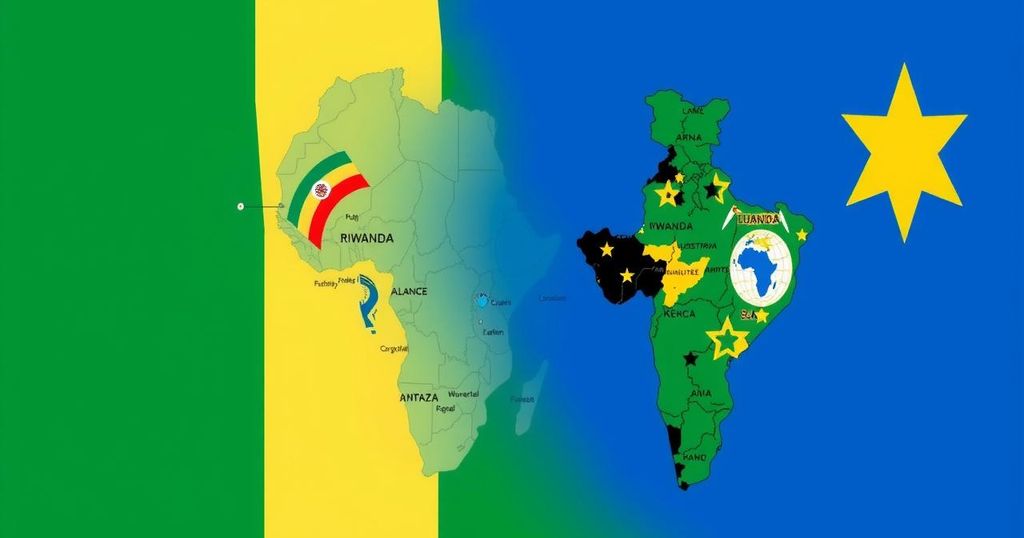Ambassador Olivier Nduhungirehe has affirmed Rwanda’s commitment to the Luanda peace process, refuting claims of military support for the M23 rebels in DR Congo. He emphasized the focus on neutralizing the FDLR and clarified that no military withdrawal arrangements were agreed upon. Rwanda’s security measures are deemed essential in response to threats posed by FDLR, rooted in long-standing regional tensions and humanitarian concerns regarding the Congolese Tutsi community.
Ambassador Olivier Nduhungirehe, Rwanda’s Minister of Foreign Affairs and International Cooperation, has reaffirmed that Rwanda is committed to the agreements established through the ongoing Luanda peace process. In a recent interview on BBC’s Focus on Africa, he refuted allegations regarding Rwanda’s military support for the M23 rebel group in Eastern Democratic Republic of Congo (DR Congo). He emphasized that, as per the Luanda framework initiated by the African Union in mid-2022 to mitigate diplomatic tensions due to the conflict between the Congolese army and the M23 rebels, the current focus is on neutralizing the FDLR, a militant group originating from Rwandan genocide perpetrators. Nduhungirehe noted that there is no provision within the Luanda agreement for the withdrawal of Rwandan troops, countering claims made by the Congolese government. He stated, “We are bound by what we say and we signed in Luanda. In Luanda, what is on the table now is a harmonized plan for the neutralization of the FDLR.” Furthermore, he mentioned that Rwanda is open to signing any agreements that align with its security interests, thereby paving the way for comprehensive peace with DR Congo. The minister highlighted that the defensive measures taken by Rwanda along its border with DR Congo are a direct response to security threats posed by the FDLR, which remains a significant concern. He clarified that previous assertions regarding troop withdrawals were unsubstantiated, emphasizing, “There is nothing in any of our outcome documents about withdrawing 4,000 troops.” Nduhungirehe reiterated that Rwanda reserves the right to adopt legitimate measures to ensure its national security against threats from armed groups and external rhetoric that could incite unrest. Addressing the underlying issues contributing to the M23 crisis, Nduhungirehe acknowledged the long-standing marginalization of the Congolese Tutsi community, asserting the necessity for direct dialogue between the Congolese government and the M23 to address these root causes effectively. He stressed Rwanda’s security concerns regarding FDLR integration into the Congolese army, stating that the organization not only endangers Rwanda’s security but also the stability of the wider Great Lakes Region.
The Luanda peace process, initiated in mid-2022 and supported by the African Union, aims to resolve the escalating diplomatic tensions between Rwanda and the Democratic Republic of Congo (DR Congo), primarily aggravated by the conflict involving the M23 rebel group. This complex issue has historical roots, tracing back to the aftermath of the 1994 Rwandan genocide and ensuing conflicts, which have significantly impacted the Congolese Tutsi community. Rwanda’s military presence and actions in the region relate closely to security measures against the FDLR, a notorious group formed by remnants of those responsible for the genocide.
In conclusion, Rwanda’s commitment to the Luanda peace process underscores its dedication to regional stability and security. Ambassador Nduhungirehe’s statements reaffirm that Rwanda is prepared to engage in discussions that prioritize its national interests, while emphasizing the importance of addressing the challenges posed by the FDLR and the historical grievances of the Congolese Tutsi community. This ongoing strife necessitates diplomatic efforts and direct talks to foster lasting peace in the region.
Original Source: www.newtimes.co.rw







